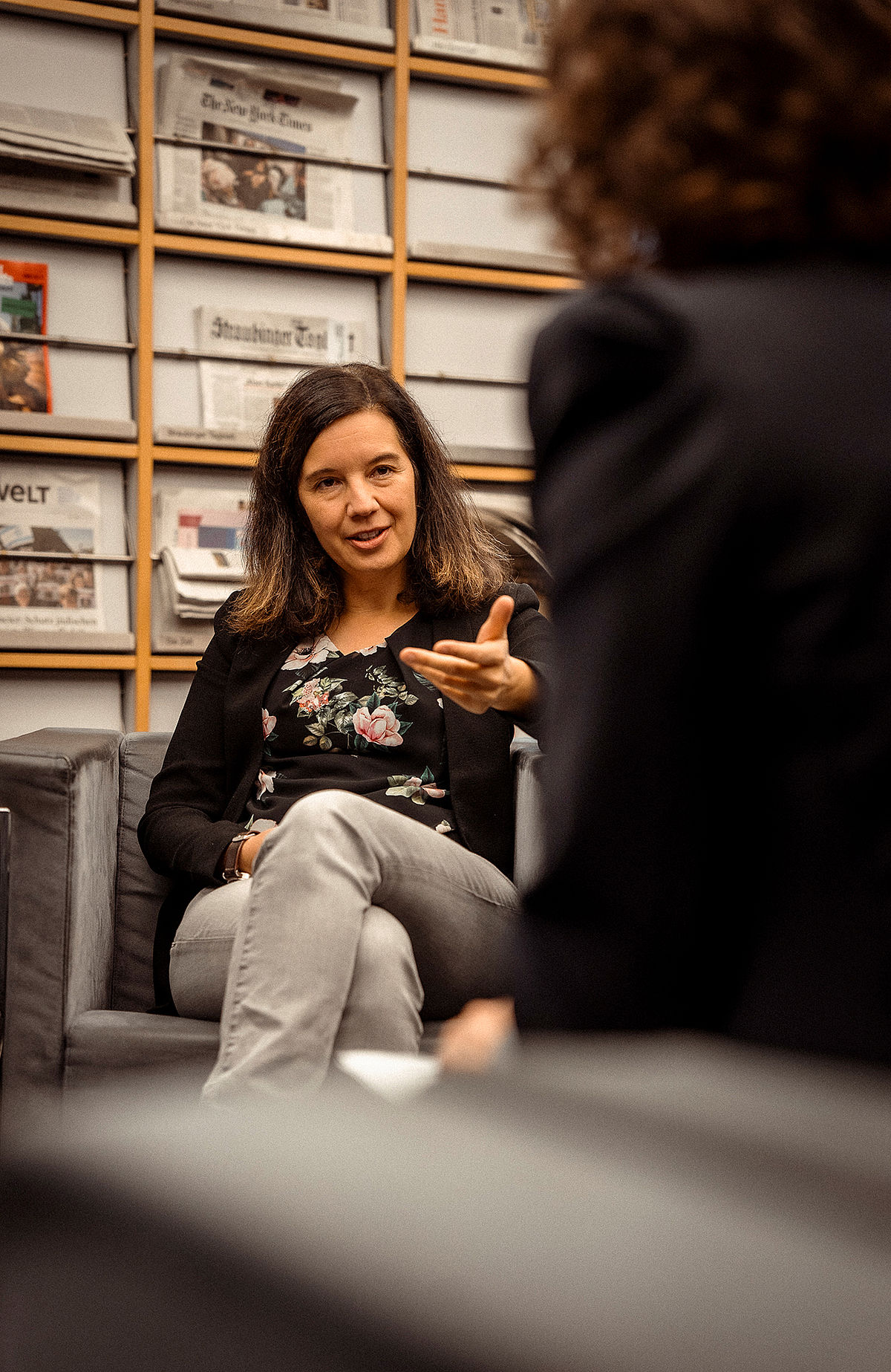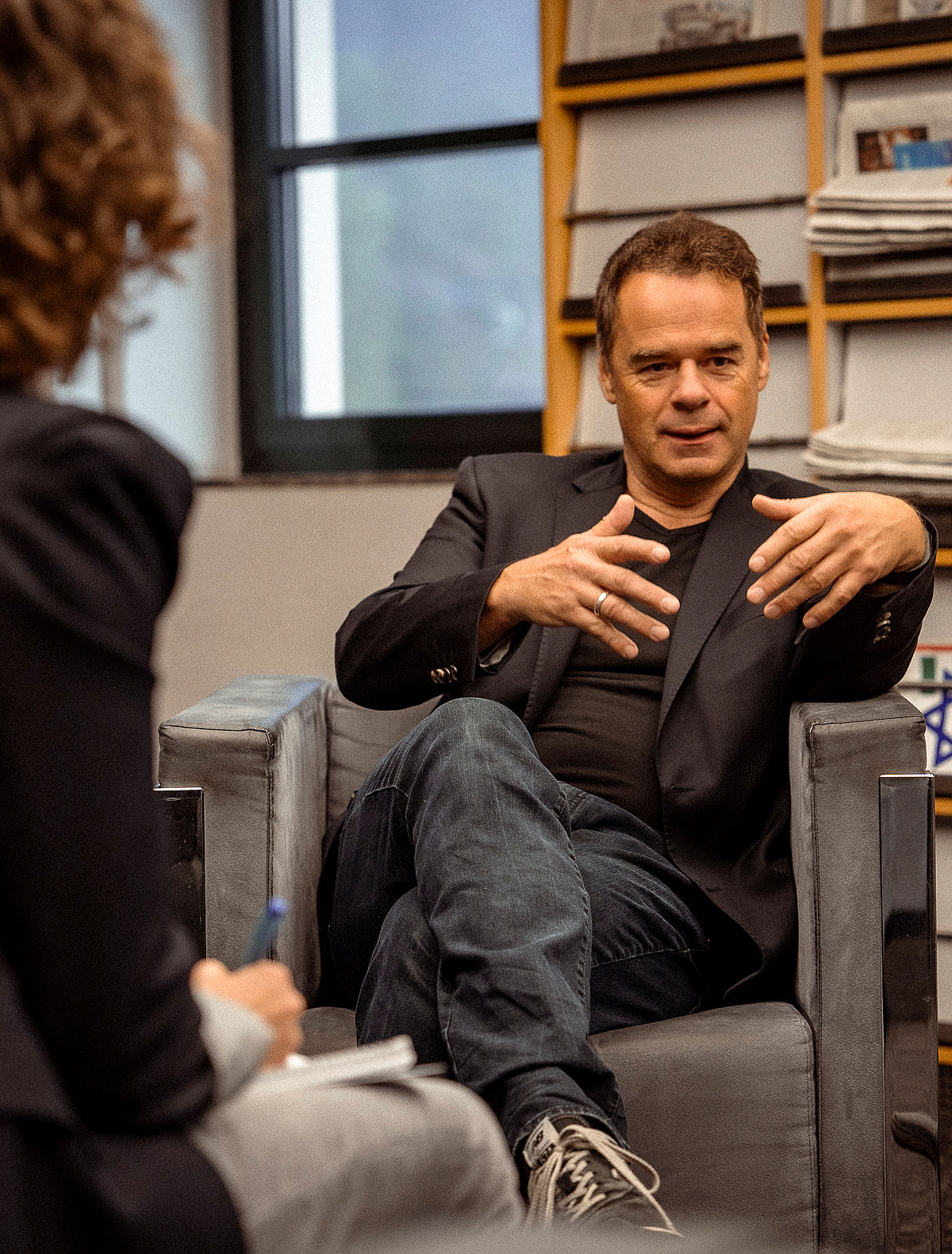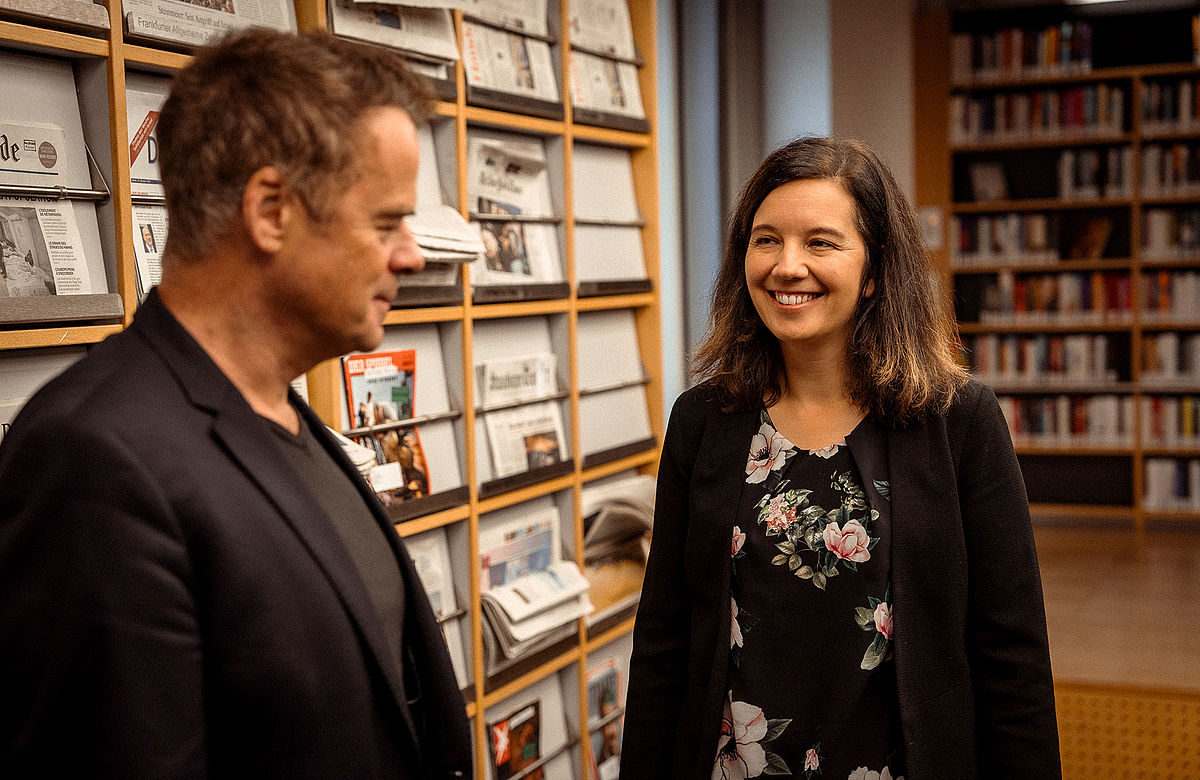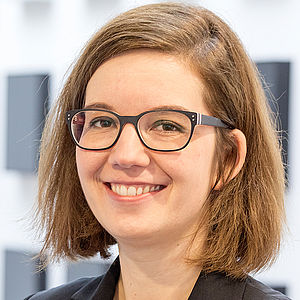Is what I do journalism?
Professor Ralf Hohlfeld: No, as I see it, that's research communication. It could take on aspects of journalist reportage once you start to ask us critical questions, also with the intention of challenging us in some way. But it doesn't actually have to be journalism when you interview people.
Professor Hannah Schmid-Petri: I concur with that. I'd say it's the university's strategic communication which has its own rationale and can inform. But even well-crafted science communication is not journalism and must be clearly distinguished from it, both in terms of the sender and with regard to critical reporting or the uncovering of scandals.
Journalism, too, is not always critical. One of its functions is to inform. Does that not constitute an overlap between journalism and science communication?
Professor Schmid-Petri: One major difference is that quality journalism is independent. That's not true of the university's communication. It has very specific goals and objectives. And that's entirely legitimate; it can be very informative as well, it's just not independent..
Professor Hohlfeld: So there can't actually be any overlap with journalism even if science communication serves lofty goals and also intends to inform. Obviously, science communication informs because someone in the background has an interest in providing information. In our degree programme "Journalism and Strategic Communication", we build an awareness for this among our students. In actual media production, it often makes no difference whether an exercise includes the public-service aspect of journalism or whether the media to be produced is for a company. We make sure to point out to the students that they need to be aware of the dual role they are juggling. On the one hand, you have that type of public-service communication and information. On the other, there's a client behind the scene.
Professor Schmid-Petri: What's important is that you disclose this fact and don't lead the recipients to believe that you are providing a journalistic product. Instead, it should be clear who the sender is so that the recipient has an opportunity to reflect on whether the communicator is pursuing specific goals with their communication.
Liliann Fischer, who is currently researching the roles of science communicators for her doctorate under your supervision, Professor Schmid-Petri, has noticed a change in the self-identification of science communicators as a result of which many of them now take a critical perspective, which is nearly consistent with a journalistic self-concept. But can communicators at universities and universities of applied science actually take a critical view?
Professor Schmid-Petri: I actually find it problematic that there is so little reflection among university communicators on these rules and the associated normativities. That actually sounds more negative than I intended. Science communication has its worth and has an important contribution to make to journalism. You can certainly try to report in a highly discerning manner about research at your own university. In so doing, however, you're not taking into account the state of research at other institutions.
Professor Hohlfeld: I totally get what communicators are thinking, in that science is in search of truth and so is journalism. As far as that goes, we're kindred spirits. And yet there is something that distinguishes us, the fundamental difference that a university's research communication is not independent. We've seen how wrong that can go during the COVID-19 pandemic when the University of Hamburg issued a press release describing the theories of a physics professor that clearly depart from the state of the art in science. The press office should have probed more deeply in that case.
But is that really the communicator's job? It's not really my place to challenge the researcher's expertise.
Professor Hohlfeld: What I'd definitely like to see is a maximum review of the case. Of course, communicators must be able to rely on us doing our research to the best of our knowledge and belief and in accordance with ethical standards, but, at the end of the day, it's the press office that decides whether something is published or not.
Professor Schmid-Petri: It’s quite clear what happened at the University of Hamburg is quite clear. However, there are other examples where matters are not so obvious. I'd expect a communication department to be able to verify the state of play in any subject matter, especially at major universities. The case in Hamburg became a controversy even in the faculty community. Some see in it as a failure on the part of the communication department. Others, and I'd count myself amongst them, see it as a failure on the part of the researcher. He had failed to adhere to the ethical standards of science. However, communication departments can define certain quality criteria. For instance, they could only issue press releases that have been peer reviewed.
Professor Hohlfeld: In times of calm, I'd agree. But what to do when we're in the midst of an acute crisis. These pre-print publications, like the thesis paper in Hamburg, played an important role during the pandemic. It was important to make the virologists' and microbiologists' newest research findings available in short order. Had we held off until the findings were peer-reviewed, we would have lost a great deal of time. So, the people in charge of communication may just have to play a more vigorous role in times of crisis.
As I see it, there is a question that has not yet been answered: Who, ideally, should do communication? Does it really make sense for every researcher to publicly communicate every single result they produce?
Professor Hannah Schmid-Petri
Do we need ethical standards for science communication?
Professor Schmid-Petri: It's obvious that we need a set of guidelines, and, in fact, we already have some. Take the Guidelines for good science PR, for instance, which were brought out by the Siggen Circle based on journalistic criteria. As I see it, there is a question that has not yet been answered: Who, ideally, should do communication? Does it really make sense for every researcher to publicly communicate every single result they produce? To me that's rather crucial since it needs to be someone who can handle such a large volume of detailed information. Non-experts will hardly be able to tell what's what. To me it would make sense to communicate the state of research in aggregate form. That's what journalism does sometimes. Here's a question that could be part of such an ethical code: How can we, as a discipline or faculty community, communicate well on a higher level?
In our age of generative language models like ChatGPT, the sheer volume of information will likely increase, also because of disinformation which remains difficult to distinguish. What is the task of science communication and what is the task of journalism?
Professor Hohlfeld: I believe that journalism is facing a major challenge but will again succeed in reinventing itself because it will go from being a gatekeeper to being a gate-advisor, with which I mean people who help to track down, identify, and demystify disinformation. I also see it as an opportunity for strategic communication. In my view, strategic communication has a certain claim to truth even though it's driven by particular interests. At least that's what I've gathered from the many conversations I've had with people responsible for PR who are willing to disassociate themselves very clearly from disinformation and fake news.
Professor Schmid-Petri: It's precisely during the COVID-19 pandemic that the true value of journalism became apparent. Many people fell back on journalistic sources like public-service broadcasters. You knew the information was of high quality, that it had been researched, and that, to the extent possible at the time, it was true. It became clear early on that traditional journalism serves a very, very important social function, particularly in times of crisis.
I had the impression that science communication had its high point in the initial phase of the pandemic. New scientific findings were communicated in near real time and there was an effort to empower the public in giving it a handle on the new terminology. It didn't take long for the researchers making the statements to be attached. What can be done to prevent the mood from changing so suddenly?
Professor Schmid-Petri: Unfortunately, we don't have a universal remedy for that. However, there are principles that tell you how best to deal with hate speech and protect yourself. Transparency is certainly an important criteria and entails clarifying your approach, explaining your own achievement, and disclosing your own working principles. Both scientists and journalists need to do that. Studies have demonstrated that such a policy builds trust and also leads to a better understanding of the background processes and, definitely, to an appreciation of the accompanying problems. This could be done, for instance, by admitting that there are uncertainties in science, but that this does not constitute any failing on the part of science and is part of the scientific work process.
It's our responsibility in our capacity as scientists to facilitate an understanding across these different systems of logic and to persistently communicate that our knowledge is more complex than what society needs.
Professor Ralf Hohlfeld
Professor Ralf Hohlfeld: Science and journalism can use transparency and reflexivity to pull the plug on populism. We as scientists must make clear that we move ahead a step at a time, that we develop hypotheses, test them, and actually expect the hypotheses not to hold up initially, that we try to fail better every time. That goes without saying for us scientists. But it's a fallacy on our part to believe that everyone takes after our logic. It's our responsibility in our capacity as scientists to facilitate an understanding across these different systems of logic and to persistently communicate that our knowledge is more complex than what society needs. And this is where university communicators can lend a hand, for instance when young researchers weigh in on sensitive topics and encounter hostility on the social networks.
While preparing for this interview, I asked ChatGPT to suggest interview questions. Lots of them were usable but rather uninspiring. However, there was one I liked: How can communicators and journalists put their heads together to communicate scientific findings clearly and understandably?
Professor Hohlfeld: They should remember – in awareness of the fact that a person plays different roles – that all those involved are working on a shared objective. They need to realize that they are two sides of the same coin, but that the two systems depend on each other and that there are lots of interfaces which can be dealt with jointly in times of crisis.
Professor Schmid-Petri: Science communication is capable of providing articles about individual excerpts, projects, and research results that, in the ideal case, are well researched and comply with quality criteria. Journalism has the task of bundling, evaluating, classifying and, to some extent, aggregating this information. If you take a look at the areas of activity in these two systems, that's how good collaboration could work.
Professor Hannah Schmid-Petri and Professor Ralf Hohlfeld organised the annual conference of the Science Communication and Journalism Studies divisions of the German Communication Association (DGPuK) at the University of Passau in September 2023. The focus was on opportunities and challenges of digitalisation for journalism and science communication.
Professor Ralf Hohlfeld
What challenges for raising public awareness arise as a result of digitisation?
What challenges for raising public awareness arise as a result of digitisation?
Professor Ralf Hohlfeld has held the Chair of Communication Studies at the University of Passau since September 2008. He established the bachelor’s degree programme “Journalism and Strategic Communication” and ran it from 2017 to 2021. He is also the spokesman for the Collegial Management of the Passau Centre for Digitalisation in Society (CeDiS). His research focuses are in the field of empirical journalism research, media change and disinformation in the digital society.
Professor Hannah Schmid-Petri
How are digitalisation issues publicly discussed and what consequences does that have for political processes?
How are digitalisation issues publicly discussed and what consequences does that have for political processes?
Professor Hannah Schmid-Petri is the holder of the Chair of Science Communication at the University of Passau and leads the Fraunhofer 'Science Communication' research group, which is based at the Fraunhofer Cluster of Excellence 'Integrated Energy Systems' CINES. She is also one of the principal investigators of the DFG Research Training Group 2720. She analyses public discussions on political issues such as digitalisation and climate change.








![[Translate to English:] [Translate to English:]](https://www.digital.uni-passau.de/fileadmin/_processed_/3/5/csm_Nour_Shaban_fc4be1f6b2.png)
